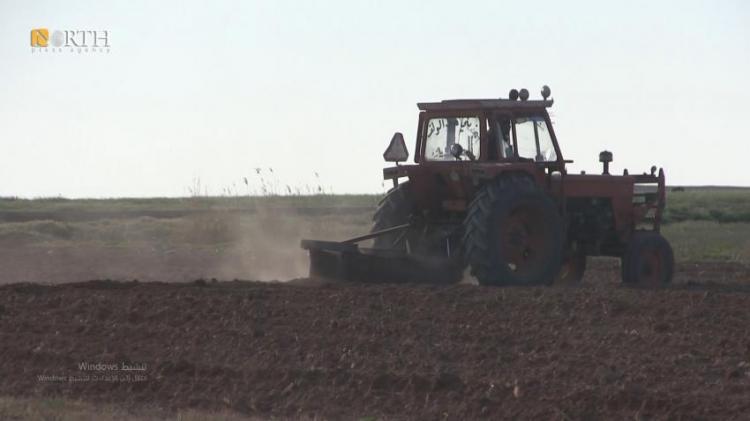Decline in demand and calls for more support of cotton growing in Raqqa
Raqqa – North-Press Agency
Ahmad al-Hassan
The city of Raqqa, northern Syria, is witnessing a readiness by farmers to start growing cotton this month, amid a noticeable decline in interest in this crop due to the high cost of basic materials such seeds, fertilizers, and pesticides, in addition to the farmers’ complaints about the lack of support provided by the Civil Council in comparison to other types of agriculture.
Since the beginning of April, farmers in Raqqa began plowing their lands and spraying soil fertilizers in preparation for sowing seeds that are carried out by the labor force.
Ali al-Issa, a farmer from the village of Kabsh Gharbi, west of Raqqa, said that high prices of basic necessities caused the decline of the growth of cotton this year, saying: “One dunum (approximately a quarter of an acre) needs more than SYP 35,000 initially to sow it with cotton.”
Al-Issa added that no assistance has been provided to them so far, and that they are forced to borrow from livestock farms’ owners and agricultural wholesalers to meet their needs of organic fertilizers and seeds, whose prices are often in dollars.
In this regard, cotton farmers complain about the lack of support, where they buy basic materials in US dollars, while their products are bought in Syrian Pounds, in addition to the traders’ control of crop prices because the Agriculture Committee does not buy their products.
Khalaf al-Abed, a farmer in Tishreen Farm, northern Raqqa, said that the wage of one worker SYP 350 per hour, saying: “Maybe it is high for the landowner, but it is low for the worker due to the high cost of living.”
On the other hand, Ahmad al-Makri, a tractor owner from the village of Kabsh al-Westi, northern Raqqa, said that plowing one dunum of land costs more than SYP 6,000, because of the high price of diesel in the black market, as fuel stations are always crowded and are closed at 10:00 am due to the curfew decision.
He added that spare parts and maintenance prices are also high, demanding the cooperative associations of farmers in the countryside of Raqqa and the Agriculture Committee in the city to provide facilities for the owners of tractors to obtain the diesel.
The plan for this year includes growing cotton in the countryside of Raqqa at a rate of 35% of the area of the lands, according to agricultural associations in the region.
Head of the Agricultural Association in the village of Kabsh Gharbi, Abboud al-Khalaf, told North Press that the main reason for the decline in demand for cotton in Raqqa is the high cost, as growing one dunum of agricultural land with cotton costs SYP 70,000.
Al-Khalaf indicated that there are complaints by the farmers about the prices set by the Autonomous Administration to purchase cotton, which is SYP 350 per kilo, and that they are about to support the farmers with diesel and fertilizers for the second batch, “to encourage them to grow and support cotton in Raqqa.”
He stated that the agricultural association will provide these materials in coordination with the Agriculture Committee through the local councils in the villages.
Cotton growing in Raqqa is considered a basic and important staple, and it occupies a wide area of the total land compared to other Syrian regions, because of the fertile agricultural lands and the availability of water needed to irrigate this crop, as it is one of the summer crops that need large quantities of water, not to mention the abundant expert workforce in this field.

